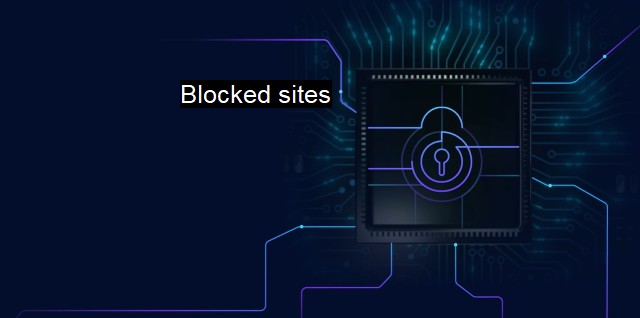What are Blocked sites?
The Challenge of Blocked Websites: Understanding the reasons for restrictions and navigating around them in the realm of cybersecurity and antivirus
Blocked sites, in the context of cybersecurity and antivirus technology, are websites or online services that have been made inaccessible to users by internet service providers, network administrators, or even governmental organizations. In simple terms, a blocked site is a web page you cannot access with your computer or mobile device.From a cybersecurity perspective, site blocking is an essential feature, as it is an invaluable tool in mitigating the threats posed by malicious websites. It can prevent access to sites known to distribute malware, engage in phishing attacks, harbor viruses or exploit technical vulnerabilities of Internet users' devices to execute cyber crimes. It also restricts access to sites that have suspicious or harmful content and discourages unsafe online behavior.
Site blocking usually happens through an automated process set by network administrators or initiated by antivirus software. These systems use advanced algorithms to scan sites for suspicious activity or content, and if anything harmful is detected, the site gets added to a sort of 'blacklist'. Every time users attempt to visit a site, the connection request is checked against the blacklist. If the site they're attempting to access is listed, access is denied and the user is informed that the site has been blocked.
Likewise, browsing on the internet is like navigating a minefield, where a single click can lead to a disastrous infection. Malware, short for malicious software, refers to a plethora of harmful entities like computer viruses, worms, Trojan horses, ransomware, and spyware, among others. These are created with malicious intent, mainly to damage data, steal sensitive information, or disrupt computer operations. When users accidentally visit a deceptive website and download contents, malware can gain access to the system and apply its destructive impact.
Antivirus programs can help in this situation. They are specifically designed to detect, block, and remove such harmful programs. Antiviruses shield your device and protect it against these online attacks. They heighten the wall of defense by implementing a suite of protection tactics, one of which is blocking malicious websites. This limits the channels through which viruses may enter your system, reducing the risk of infection.
Alongside, 'Site Blocking' is also a part of cybersecurity protocols in corporations to preserve sensitive information. Many companies install powerful firewalls and use Virtual Private Networks (VPNs) to encrypt and safeguard their data. Not only do they work on blocking access to potential threat websites but also often block access to non-work related websites, preventing employees from wasting company time and ensuring productivity.
Blocked sites, whether they are obstructed due to harmful content or to increase productivity, form a crucial part of cybersecurity measures in the current time. It is an efficient mechanism to prevent risks, and while it may cause some inconvenience to users, especially those who feel their freedom of browsing is being impinged, the end goal of ensuring the security and integrity of information in our increasingly connected world warrants this price.
By establishing strong lines of defense and implementing protective measures like website blocking, we can ensure safer cyber space and protect sensitive information. This inevitably strengthens cybersecurity, keeping the internet environment healthier and secure, and enabling individuals, businesses, and governments alike to harness the full power of the digital world with confidence and freedom.

Blocked sites FAQs
What are blocked sites in the context of cybersecurity and antivirus?
Blocked sites refer to websites that have been deemed unsafe or malicious by your antivirus or firewall software. These websites are typically blocked to prevent users from inadvertently downloading malware, viruses or other malicious programs. Blocking these sites is an important part of keeping your system secure and preventing cyber attacks.Why do antivirus programs block sites?
Antivirus programs block sites that are known to host malware, viruses, or other malicious content. They do this to protect your computer and data from potential threats. By blocking these sites, antivirus programs help prevent cyber attacks and keep your system safe.Can I unblock a site that has been blocked by my antivirus program?
Yes, it is possible to unblock a site that has been blocked by your antivirus program. However, before doing so, you should ensure that the site is safe to visit. If you are unsure, it is best to leave the site blocked to avoid potential cybersecurity risks.What should I do if I encounter a blocked site warning?
If you encounter a blocked site warning from your antivirus software, you should immediately close the site and refrain from visiting it. This warning is typically displayed when your antivirus program detects potentially harmful content on the site. You should then run a full scan of your system to ensure that it is not infected with any malware or viruses.| | A | | | B | | | C | | | D | | | E | | | F | | | G | | | H | | | I | | | J | | | K | | | L | | | M | |
| | N | | | O | | | P | | | Q | | | R | | | S | | | T | | | U | | | V | | | W | | | X | | | Y | | | Z | |
| | 1 | | | 2 | | | 3 | | | 4 | | | 7 | | | 8 | | |||||||